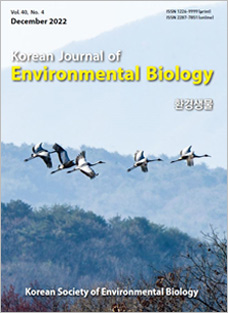Instructions for Reviewers
We believe that the review process is a cornerstone for maintaining the academic quality and research integrity of the Korean Journal of Environmental Biology (KJEB). All manuscripts submitted to KJEB, including invited submissions, undergo peer review. The following guidelines explain the review system and process operated by KJEB, as well as the role of reviewers.
1. Double-Blind Review System
The KJEB operates a double-blind review system. All submitted manuscripts are reviewed in advance by the editorial board to determine whether or not to proceed with the review process. This process evaluates submitted manuscripts for compliance with the KJEB’s aims, scope, and writing guidelines. The managing editor removes personal information from manuscripts that have passed the preliminary checks and creates review-ready copies. The editorial board requests the review of anonymized manuscripts by two or more reviewers from institutions different from the authors. The editor-in-chief collects the reviewer’s decision and the editorial board’s opinion and notifies the corresponding author of the final decision by e-mail. The decision email will display the reviewer's comments anonymously. If the author is not convinced of the review results, they can raise an objection to the editorial board by e-mail within one month from the date of notification. The editorial board scrutinizes the objection raised by the author and decides whether to proceed with an additional review.
2. Role of Reviewers
The role of the reviewer is to carefully evaluate the manuscript and recommend a decision (revise, accept, or reject) to the editor. Reviewers should meticulously assess not only the academic excellence of the manuscript but also its methodological completeness, ethical integrity, and other relevant aspects. Additionally, reviewers should leverage their expertise to identify errors in the manuscript and provide advice for qualitative enhancement. The ultimate role of the reviewer is to facilitate the qualitative improvement of submitted manuscripts, thereby contributing to the advancement of KJEB.
3. Accepting an Invitation to Review
The editor invites researchers with outstanding expertise in the academic field of the submitted manuscript to serve as reviewers. Upon receiving an invitation e-mail for review, the invited researcher must consider the following factors before accepting:
(1) Expertise in the academic field of the manuscript: Reviewers must assess whether they have sufficient expertise to evaluate the submitted manuscript. If they feel inadequately qualified to review the manuscript, they should decline the review request.
(2) Potential conflicts of interest: Reviewers should decline review requests if they can deduce the authors based on the manuscript's content or if there are any conflicts of interest related to their own research or any association with the research.
(3) Availability of time: KJEB typically allocates a primary review period of two weeks. Reviewers must assess whether they have sufficient time to conduct the review within this period. If they anticipate excessive delays in completing the review, they should decline the review request. Generally, the editor may extend the review period for up to five weeks if the reviewer accepts the review request.
4. Guidelines for writing review comments
Reviewers may accept the review request by selecting ‘accept’ in response to the review invitation email. Reviewers should thoroughly and carefully evaluate the manuscript, assessing the following items:
1) the academic value of the manuscript, 2) completeness of the manuscript in terms of composition and systematization, 3) objectivity of survey, experimental, and analytical methods, 4) adequacy of tables and figures and academic level of discussion, 5) appropriateness of citations and notation of references, 6) originality of the research content, and 7) the appropriateness of the research contents from the perspective of universal ethics.
There is no strict style and format for writing review comments. However, when writing review comments, the following should be considered:
(1) Review comments should be polite and respectful. Reviewers should respect the authors as fellow-researchers.
(2) Review comments should be written clearly and unambiguously to avoid misinterpretation.
(3) Review comments should not include coercion to cite specific references, request changes in the interpretation of research results based on insufficient academic evidence, or suggest subjective and intentional changes in the direction of the research.
(4) Review comments should comprehensively and specifically describe both the strengths and weaknesses of the manuscript. Additionally, reviewers should carefully suggest directions for improvement based on sufficient academic evidence.
The reviewer makes the following decisions based on the evaluated items:
A) Accept: The submission can be published without revising the contents.
B) Accept with minor revisions: The submission can be published after minor corrections, including typographical and contextual errors in the manuscript.
C) Major revision: Re-review is required after revising the overall composition and content of the manuscript.
D) Reject: The submission is not suitable for publication in the KJEB.
Vol. 40 No. 4 (2022.12)

Frequency quarterly
Doi Prefix 10.11626/KJEB.
Year of Launching 1983
Publisher Korean Society of Environmental Biology




Online Submission
submission.koseb.org
KOSEB
Korean Society of Environmental Biology
Contact info
Any inquiries concerning Journal (all manuscripts,
reviews, and notes) should be addressed to the managing
editor of the Korean Society of Environmental Biology.
Yongeun Kim,
Korea University, Seoul 02841, Korea.
E-mail: kjeb@koseb.org
Tel: +82-2-3290-3496 / +82-10-9516-1611






